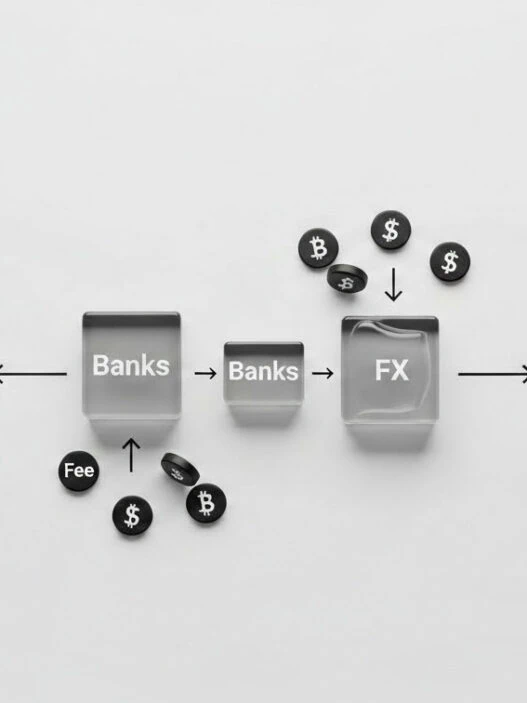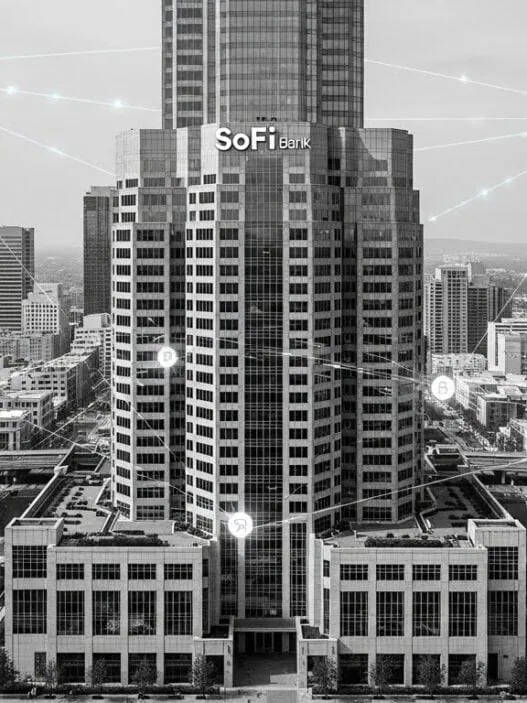Self-sovereign identity could be the future of luxury travel, offering mathematical proof of identity without physical documents.Private jets used to scream “look at me.” But I’ve noticed something interesting happening at premium terminals lately.
A few months ago at Teterboro, I watched a passenger clear customs faster than I’ve ever seen. No paperwork delays, minimal interaction, just a quick biometric scan and they were through. When I asked about it, the response was vague – something about “enhanced processing for verified travelers.”
It got me curious about emerging privacy-focused travel technologies that could reshape how travelers move through the world. The concept is fascinating: what if you could travel with mathematical proof of identity instead of physical documents?
The Growing Privacy Concerns
Travelers across all income levels face legitimate privacy challenges in today’s digital world. Flight tracking websites, hotel data breaches, and social media surveillance create security concerns that go beyond inconvenience.
Recent breaches at major hotel chains have exposed travel patterns, preferences, and personal details of business travelers and private individuals alike. These incidents highlight why privacy-conscious travelers are exploring alternatives to traditional document-based systems.
The current travel experience requires handing over passport copies, credit card details, and personal information to dozens of service providers. Each interaction creates potential vulnerability points where sensitive data could be compromised.
Some forward-thinking travelers are already using enhanced biometric systems like Global Entry and Clear to minimize document exposure. These represent early steps toward more privacy-focused travel infrastructure.

Understanding Self-Sovereign Identity
Self-Sovereign Identity (SSI) represents a developing approach to digital identity verification. Instead of carrying physical documents or relying on centralized databases, SSI uses cryptographic methods to prove identity while keeping personal data private.
The technology works through Web3 wallets that store verified credentials in encrypted form. When you need to prove something about yourself – citizenship, age, financial status – the system can verify that information without revealing underlying personal details.
Think of it like showing a mathematical proof instead of your actual passport. The verification happens, but your personal information stays protected. This concept, called zero-knowledge proof, is already being tested in various applications beyond travel.
Early implementations suggest this approach could reduce the number of times travelers need to hand over sensitive documents. More importantly, it could give individuals greater control over their personal data in an increasingly connected world.
Potential Applications That Could Change Everything
The theoretical applications extend far beyond airport security. SSI could create seamless luxury experiences that eliminate friction while maximizing privacy.
| Pain Point | Potential SSI Solution | Future Status Upgrade |
|---|---|---|
| Customs delays | QR scan → instant visa verification | Skip lines like a diplomat |
| Hotel check-ins | NFC tap → unlocks suite + silent payment | Zero front-desk interaction |
| Art purchases mid-flight | Prove funds + authenticity instantly | In-air gallery acquisitions |
| Private terminal access | Biometric unlock without human verification | Ghost-mode arrival |
The art acquisition scenario illustrates the potential perfectly. A collector flying from New York to Basel could theoretically purchase million-dollar pieces during the flight using SSI to verify both their financial capacity and the artwork’s provenance. The entire transaction would happen in international airspace with cryptographic certainty but zero paper trail.
Tokenized luxury assets become instantly tradeable when both buyer and seller use SSI verification. No banks, no lawyers, no delays – just mathematical proof of ownership and funds.
A Practical Example
Let me walk you through how this might work in practice using Aspen as an example. Currently, flying into Aspen Pitkin County Airport during ski season involves multiple document checks and verification steps.
Current Process:
- Land at ASE
- Present passport/ID to customs
- Coordinate ground transportation
- Check into hotel with document copies
- Multiple verification touchpoints
Potential SSI Process:
- Biometric verification during arrival
- Automated customs clearance via cryptographic proof
- Ground transport coordinated through digital credentials
- Hotel access via verified identity without document handling
- Reduced physical document exposure
The key advantage isn’t speed – it’s data control. You’d still comply with all security requirements, but using mathematical verification instead of document copying. This could reduce the number of entities that store your personal information.
High-end private aviation operators are already integrating SSI systems into their booking platforms. The technology exists today – it’s just a matter of adoption reaching critical mass.
Current Industry Development
SSI technology is being developed by legitimate organizations rather than speculative crypto projects. The World Wide Web Consortium (W3C) has established standards for decentralized identity. The European Union is piloting digital identity frameworks that incorporate similar principles.
Major technology companies and government agencies are exploring these approaches because they could actually improve security while enhancing privacy. Instead of storing personal data in centralized databases that become breach targets, the information stays with individuals.
Some private aviation companies are beginning to explore how these technologies might integrate with existing booking and security systems. The Falcon 900’s advanced avionics represent the kind of sophisticated systems that could potentially support enhanced identity verification.
The development is happening through established channels rather than underground networks. Early pilots focus on practical applications like reducing document handling while maintaining security compliance.

Privacy Considerations for All Travelers
All travelers face privacy challenges, though some experience unique concerns. Travel patterns can reveal personal relationships, business activities, and security vulnerabilities that have real-world consequences.
Various industries have been exploring enhanced privacy measures for traveler protection. These aren’t secretive arrangements but practical security considerations that help protect individuals from harassment and ensure personal safety.
Business travelers managing sensitive information have legitimate reasons to minimize their digital footprint during travel. Current technologies like Global Entry and TSA PreCheck provide some privacy benefits, but they still require extensive data sharing.
AI concierge services are beginning to incorporate privacy-focused features that could provide personalized service without storing identifiable information long-term.
The Development Timeline
The infrastructure development is happening in phases. Major airports in Dubai, Singapore, and Switzerland are testing biometric systems that could eventually support SSI verification for premium passengers. Private aviation hubs are exploring similar capabilities as the technology matures.
The user experience could become remarkably simple. You might enroll your biometrics once with a certified provider, then use simple scans or NFC taps for every subsequent interaction. No apps to manage, no tokens to buy, no technical complexity.
Cost barriers would be minimal for the luxury travel market. SSI enrollment might cost $2,000-5,000 per person – less than a single transcontinental charter flight. The ongoing verification fees could be negligible compared to traditional luxury travel expenses.
The real barrier is coordination across service providers. SSI works best when airlines, hotels, ground transport, and activity providers all support the same standards. This network effect is building rapidly as early adopters prove the business case.
Secure Transaction Possibilities
One interesting application of SSI technology involves secure financial verification without exposing transaction details. The system could theoretically verify someone’s ability to make a purchase without revealing bank account information or spending history.
This could enhance privacy for luxury transactions during travel. Cryptocurrency payments might integrate with identity verification systems to provide mathematical proof of funds without traditional financial surveillance.
The tokenized travel ecosystem being developed by various companies relies on similar verification principles to enable fractional ownership and asset transfers.
These applications could transform how high-value transactions happen during travel – from art acquisitions to property investments – by providing verification without extensive documentation.

The Network Effect Acceleration
We could be approaching a tipping point where SSI technology shifts from experimental concept to practical luxury infrastructure. Major luxury hotel chains are exploring SSI-compatible check-in systems. Private aviation companies are researching integration with flight booking platforms.
The convergence might create seamless luxury experiences that are impossible with traditional identity systems. Your preferences, security clearances, and financial verification could travel with you cryptographically while your personal information stays completely private.
Legal and Regulatory Framework
The regulatory environment is evolving to support SSI rather than restrict it. Governments recognize that cryptographic identity verification can be more secure and auditable than traditional document systems.
European privacy regulations (GDPR) actually favor SSI because it gives individuals complete control over their personal data. Instead of trusting hundreds of companies to protect your information, you control access through cryptographic keys.
Aviation authorities are developing SSI integration standards for security screening. The technology can provide better verification than traditional documents while creating audit trails that satisfy regulatory requirements.
The legal framework treats SSI credentials as mathematically verified attestations rather than stored personal data. This distinction provides stronger privacy protection than traditional document systems.
Future Integration Points
The trajectory points toward SSI becoming standard infrastructure for luxury services. Early indicators suggest broad adoption within 24-36 months across major travel hubs and luxury service providers.
Concierge services are developing SSI-native platforms that can fulfill complex requests without ever knowing client identities. The mathematical verification allows trusted service delivery while maintaining complete anonymity.
Luxury real estate transactions, art acquisitions, and high-value investments will increasingly rely on SSI verification to enable instant, anonymous transfers of significant assets.
The Future of Privacy-Focused Travel
We’re seeing early signs of a shift toward more privacy-conscious travel experiences. This isn’t about hiding from legitimate authorities, but about maintaining control over personal data in an increasingly connected world.
The trend toward privacy-focused services reflects growing awareness of data security issues among all travelers. Traditional travel conveniences are being complemented by privacy technologies that offer discretion and data control.
SSI represents one approach to this challenge – using cryptographic verification instead of document sharing to prove identity while traveling. The technology could eventually offer the same verification benefits with enhanced privacy protection for anyone who values data security.
Looking Forward
This technology is still developing, but the foundational elements are being built today. Biometric systems, blockchain identity standards, and privacy-focused travel services represent early steps toward more sophisticated implementations.
For travelers interested in enhanced privacy, existing options include premium security services, biometric travel programs, and privacy-focused concierge services that minimize data exposure.
The development of SSI and similar technologies will likely continue through established industry channels rather than speculative ventures. The focus remains on practical applications that enhance both security and privacy.
As these systems mature, they could offer new options for travelers who value discretion. The key is staying informed about developments while using currently available privacy tools effectively.
The future may indeed belong to those who can verify their identity without compromising their privacy – but that future is still being built through careful, methodical development rather than revolutionary disruption.
External Resources:





















